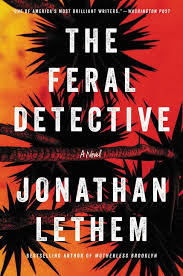REVIEW: Jonathan Lethem's Novel of a Woman Searching in the Age of Trump
/The Feral Detective by Johnathan Lethem Ecco, 336 pp.
By Heather Scott Partington
I’m starting to think that the canon of the Trump presidency will be nothing like the man, himself; it won’t be meretricious literary bedlam that helps us examine our complicity or action during this dark time. Noise doesn’t counter noise. Sometimes fiction more subtly approaches the truth of a moment. Novels like Jonathan Lethem’s The Feral Detective, which employ the doom of the first days of Trump’s election like a jarring movie score of two warring, animalistic desert tribes, pare away our attachments to cliched news-cycle narratives and give us weirder, truer ones.
The Feral Detective disguises itself initially as a mystery: Phoebe Siegler, who quits the Great Gray Lady once her bosses sit down to flatter the president-elect, is a fish out of water in southern California’s Inland Empire, where she has gone in search of her friend’s daughter: Arabella Swados, Manhattanite, and “eighteen-year-old Reed dropout,” vanishes and is believed to be on a Leonard Cohen-inspired journey to Mount Baldy. Phoebe meets the titular “Feral Detective,” Charles Heist, a sinewy, trailer-park cowboy with a penchant for rescuing strays, and follows him into the desert to search for Arabella amongst the ranks of the “Rabbits” and the “Bears”: antipodal, gendered hippie tribes living off-grid. Lethem’s mystery is secondary, at best, but he mines tension from the Rabbit and Bear clans’ violent history and ethos, and Phoebe searches for meaning independent of the world she knows.
Phoebe offers an outsider’s perspective of California, presenting the dilemma, at first, of typical New York vs. Los Angeles stereotypes. But Lethem reveals to her that SoCal is more complicated than its cliches or its myths. “‘You become yourself out here,’” a friend tells her soon after she arrives, perpetuating the narrative of Southern California as a land of self-creation, yet offering a viable plan for Phoebe. Phoebe does not deign, initially, to spend time in the stuccoed suburbs where she meets Heist, but he quickly takes her out to L.A.’s wild periphery, where, cut off from civilization, Phoebe tries to reconcile her pre-Trump, Manhattan sense of self with a more carnal iteration of her personality.
There were no buildings here, no skyscrapers or sheds, no busy lanes of traffic or jets queued for takeoff to resort destinations, no crappy chain stores or alluring hipster boutiques. No person pulled another an espresso shot. I couldn't scroll up or swipe left or right. Only stones and shadows of stones, Joshua trees, unlit torches, and, as my eye accustomed to the scene, a scattering of human creatures under the bowl of night.
Lethem writes a California that is never just one thing. New York and the Golden State are sometimes viewed as twin blue parentheses hugging a sea of red states. But Phoebe and Heist track the teenager through a sea of survivalists who live entirely separate from that codified dual-party system. As the pair venture out into the desert and a world of tribal violence, Heist reveals his personal history with both the Rabbits and the Bears, his inability to view the societies without bias.
There’s irony in the fact that Phoebe drops out of reach of the nation at such a moment of great partisanship--just as Trump is inaugurated--but she simultaneously discovers the deep and complicated history between the matriarchal Rabbits and patriarchal Bears. Phoebe learns that Arabella is floating between the two groups, having taken on a new name. While she and Heist search, Phoebe mentally casts herself as a reporter on assignment, ever-conscious of how she can mine the experience for an article once she’s back in her old life. “[I]n this fantasy,” she says, “I was on a brilliant assignment into the underground that the election had in fact revealed as our nation’s dominant paradigm.” But even though Trump’s influence is felt each time Phoebe gets cell service and can check her messages, when she voices anything about the election, it breaks the spell of the off-grid world by recalling “civilized” America. “Who did you even vote for?” she asks Heist, in an intimate moment in his trailer; when the two are witness to a Rabbit and Bear ceremony, she screams at the spectators, asking them if they even voted at all. Of course they didn’t vote, and of course, her questions seem weird. But Lethem uses these interruptions to remind us that everything felt weird in the days after Trump was elected and began to sign cruel Executive Orders about immigration. Phoebe’s electoral exclamations are no stranger than what she and Heist encounter in the desert, and definitely not as strange as the way we all viewed each other with suspicion once the votes were tallied.
Though Heist and Phoebe follow the mystery until its resolution, Phoebe’s quest to redefine herself in the expanse of the Mojave Desert propels the narrative forward. By unmooring Phoebe from all the givens in her life--not just the political ones, but ideas of home and security and society--and leaving her at the mercy of these two animalistic factions, Lethem is able to underscore the uncertainty of 2016 America as it faced something new and macabre in a Trump presidency. “I was changing,” Phoebe says at one point, and then, “[Heist] wasn’t [Arabella’s] rescuer. I was.” This is not a story of a woman finding her courage, for Phoebe is a strong woman when the story begins. But it is a story about how we define ourselves through contrast with those around us.
“In case it isn’t obvious,” Phoebe says as the story begins, “there’s a detective in this story. But I’m not it. I had myself halfway cast in the role when I got on the plane, but no. Sorry. Then again, the story does involve a missing person, and it could well be me.” In fact, Heist, Lethem’s Feral Detective, is a shadowy, mysterious presence who exists less as a fleshed-out character, and more as the powerful unsolved mystery that unnerves the sharp-tongued Phoebe with his silence, his muscled form, and his long history with the desert cults. Lethem’s Phoebe becomes both savior and saved. This is not a novel about the election or the Trump presidency, and yet it is everything that 2016 was: the power of women, the sacredness of male leadership, the division into two warring, long-entrenched parties. Lethem takes us out into the desert, removing the light pollution of those narratives we accept about civics, and in so doing, allows us to glimpse our untamed reflection.
Heather Scott Partington is a writer, teacher, and book critic. She is the winner of an emerging critic fellowship from the National Book Critics Circle. Her writing has appeared in The New York Times Book Review, The Washington Post, The Los Angeles Times, Newsday, and The Los Angeles Review of Books. Heather has served as a contributor to Goodreads, Las Vegas Weekly, Electric Literature, Ploughshares, and Kirkus. She teaches high school English, and lives in Elk Grove, California, with her husband and two kids.










